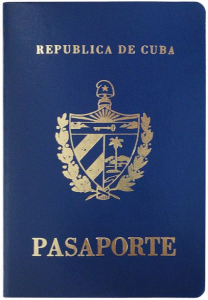On October 16, the Cuban government announced plans to eliminate controversial travel restrictions on Cuban citizens. For decades, Cubans have been required to apply for government permission to exit the country. According to the Gaceta Oficial de Cuba, the nation’s official public record for legal and regulatory reforms, this requirement will be eliminated beginning in January of 2013.
On Twitter, some users responded with elation. Francisco Vergara [1] (@vergaraf1 [2]) tweeted,
Celebro la decisión del gobierno de #Cuba [3] de eliminar el permiso de salida a sus ciudadanos. Libre albedrío puro.
I celebrate the decision of the Cuban government to eliminate the exit permit for its citizens. Pure free will.
Luis A. Gonzalez [5] (@3L_V0C3R0) welcomed the news and noted that the policy shift would likely bring an influx of Cubans to Miami:
“Cuba elimina permiso de salida” A partir del enero 14 del 2013 los Cubanos podrán salir libremente de su país. Ahora es q Miami será Cuba
“Cuba eliminates exit permission” Beginning January 14 of 2013 Cubans will be able to leave their country freely. Now Miami will become Cuba
Under the current travel application process, individuals must submit ample documentation describing the nature of their travel and obtain an official letter of invitation from the person or institution outside of the country that will host them during their time abroad. Human rights advocates and foreign government leaders alike routinely classify this policy as a violation of Cubans’ right to movement [6]. Although thousands of Cubans are granted travel permissions each year, there is a perception [7] [es] that travel permission is granted only to citizens who are in “good” political standing with the government.
While the new policy eliminates the cumbersome and expensive bureaucratic obstacles to travel, the text of the law indicates that the government will still have some discretion over who is and is not allowed to travel through the passport application process. Martí Noticias describes [8] [es] how the government may refuse to grant passports to certain kinds of professionals (in order to avoid “brain drain”) and for reasons related to national security and defense.
Prominent blogger and Havana resident Yoani Sánchez [9] [es] wrote
[A]hora en la propia confección y validación del pasaporte se definirá quiénes lograran franquear las fronteras nacionales y quiénes no.
[…]
esta no es la nueva ley de migración que estábamos aguardando. Demasiado limitada, demasiado estrecha. Pero al menos ha quedado por escrito una legalidad a partir de la cual ahora empezaremos a exigir, protestar, denunciar.
Now the process of making and validating one’s passport will determine who gets to cross national borders and who does not.
[…]
this is not the new migration law we were hoping for. It is too limited, too narrow. But at least there is now written legislation on which we can make demands, protest, denounce.
Marta López [10] [@aircag [11]] expressed similar frustrations on Twitter:
#Cuba [3] No se necesitara permiso de salida pero el gobierno tiene el derecho de no otorgarte el pasaporte si lo estima pertinente.
You no longer need an exit permit but the government has the right to not issue you a passport if it so pleases
US-based technology researcher Larry Press [12], who focuses on Internet infrastructure in Cuba, wrote:
It is easy to imagine these caveats being used to deny passports to people like dissident bloggers, networking professionals, and computer science students and professors. One can also imagine freer flows of information and IT goods — particularly between Cuba and the US.
Mainstream media also commented on the effects that the reform would have on countries like the United States and Russia, both of which have special exceptions in their immigration policies for Cuban nationals. In the US, under the Cuban Refugee Adjustment Act of 1966 [13], Cuban nationals can obtain permanent residency in the United States after spending one year in-country.
This is not the first time that the Cuban government has lifted travel restrictions on citizens. In the 1981 Mariel Boatlift [14] and the 1994 Balsero Crisis [15], Cubans were permitted to leave the country and did so en masse. In both cases, historians saw these temporary shifts in travel policy as attempts by the Castro government to allow discontented citizens to leave the country, a move that presumably decreased pressure on the government to change policies that limit civil, political, and economic rights. While many media have drawn parallels between these events and the current situation, it is not clear that last week's decision falls into the same category.
Cuban economy expert Phil Peters [16] acknowledged some of these points, but ultimately characterized the policy as a positive step that will improve the lives of families that are divided between Cuba and other countries, and that will allow for greater exchange of knowledge and ideas, as well as capital, between Cubans and the rest of the world.
Today’s bet seems to be that Cuba will be stronger with a more normal and modern immigration policy – and that many Cubans, given the freedom to come and go, want to visit family and see the world and then return home.
